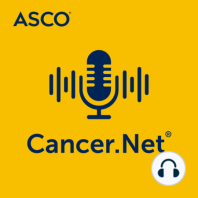6 min listen

Research Highlights from the 2020 San Antonio Breast Cancer Symposium, with Norah Lynn Henry, MD, PhD, FASCO
Research Highlights from the 2020 San Antonio Breast Cancer Symposium, with Norah Lynn Henry, MD, PhD, FASCO
ratings:
Length:
10 minutes
Released:
Jan 29, 2021
Format:
Podcast episode
Description
ASCO: You’re listening to a podcast from Cancer.Net. This cancer information website is produced by the American Society of Clinical Oncology, known as ASCO, the world’s leading professional organization for doctors who care for people with cancer. The purpose of this podcast is to educate and to inform. This is not a substitute for professional medical care and is not intended for use in the diagnosis or treatment of individual conditions. Guests on this podcast express their own opinions, experience, and conclusions. The mention of any product, service, organization, activity, or therapy should not be construed as an ASCO endorsement. Cancer research discussed in this podcast is ongoing, so the data described here may change as research progresses. In this podcast, Cancer.Net Associate Editor Dr. Norah Lynn Henry discusses new research presented at the 2020 San Antonio Breast Cancer Symposium, held virtually December eighth through eleventh. Dr. Henry is an Associate Professor in the University of Michigan's Division of Hematology/Oncology in the Department of Internal Medicine and is the Breast Oncology Disease Lead at the Rogel Cancer Center. View Dr. Henry’s disclosures at Cancer.Net. ASCO would like to thank Dr. Henry for discussing this research. Dr. Henry: Hi. I'm Dr. Lynn Henry, a breast cancer oncologist from the University of Michigan Rogel Cancer Center. Welcome to this quick summary of updates from the 2020 virtual San Antonio Breast Cancer Symposium. My institution enrolled patients in the first trial that I will discuss, otherwise, I have no conflicts of interest for any of the trials that I will talk about. Today, I'm going to focus primarily on treatment of non-metastatic breast cancers that are hormone receptor-positive and HER2-negative. These studies highlight personalizing treatment for individual patients. In the first and last trials I will mention, the studies examine whether it is possible to give less treatment without substantially increasing the risk of breast cancer recurrence. In general, giving less treatment leads to fewer long-term toxicities and better quality of life. In contrast, the other 2 trials I will mention are examining adding more therapy to standard treatment with the goal of increasing breast cancer cure rates for patients at high risk of recurrence without causing too much additional toxicity. One of the biggest stories in this meeting was the result of the RxPONDER trial. This trial enrolled thousands of women with hormone receptor-positive, HER2-negative breast cancer, who had cancer present in 1 to 3 lymph nodes under her arm. The standard treatment for patients who have lymph node positive breast cancer has been to recommend chemotherapy in addition to anti-hormone therapy. This trial is testing whether that is actually the best treatment. In this trial, every patient's tumor was tested with a test called Oncotype DX and was given a recurrence score ranging from 0 to 100, depending on how quiet or aggressive the tumor is. Women whose tumors had a score between 0 and 25, which is at the low range, were randomized, like flipping a coin, to either receiving the standard, which is chemotherapy followed by anti-hormone therapy, or to just anti-hormone therapy alone. The patients were then monitored to see if they developed recurrence of their breast cancer. Overall, there was no difference between the groups. Meaning that adding chemotherapy to the treatment did not provide a benefit in terms of reducing risk of recurrence. When they divided the groups by lower or higher score, it still didn't make a difference. However, when they divided the women by menopausal status, it did. Women who were post-menopausal when they were diagnosed with breast cancer did not get any benefit from chemotherapy. In contrast, women who were pre-menopausal did get a benefit from chemotherapy. And in fact, they lived a little longer than those who only got anti-hormone therapy. However, there's still a
Released:
Jan 29, 2021
Format:
Podcast episode
Titles in the series (100)
Dental Health During Cancer Treatment: In this podcast, we'll talk about the types of cancer treatments that may cause oral side effects, as well as the ways people with cancer can prevent and manage such dental problems. Side Effects by Cancer.Net Podcast